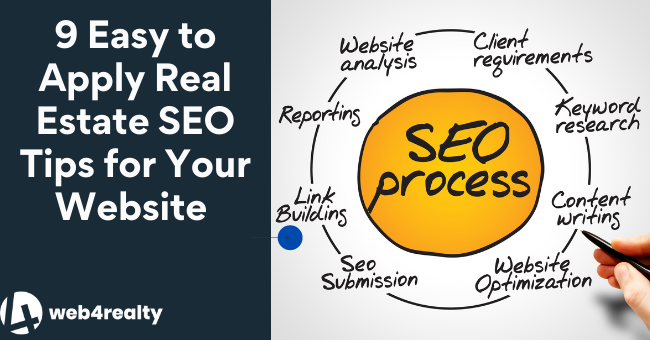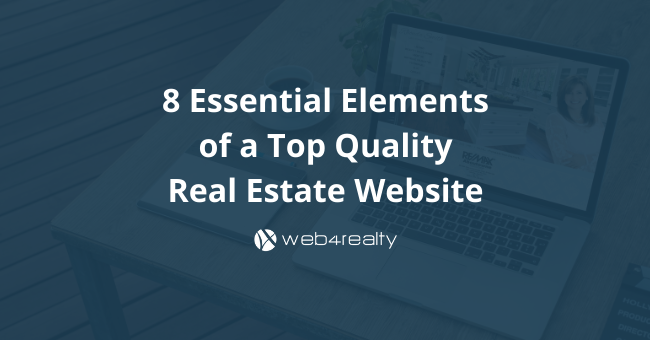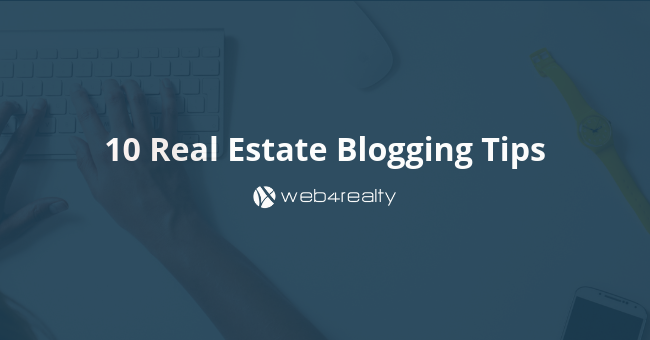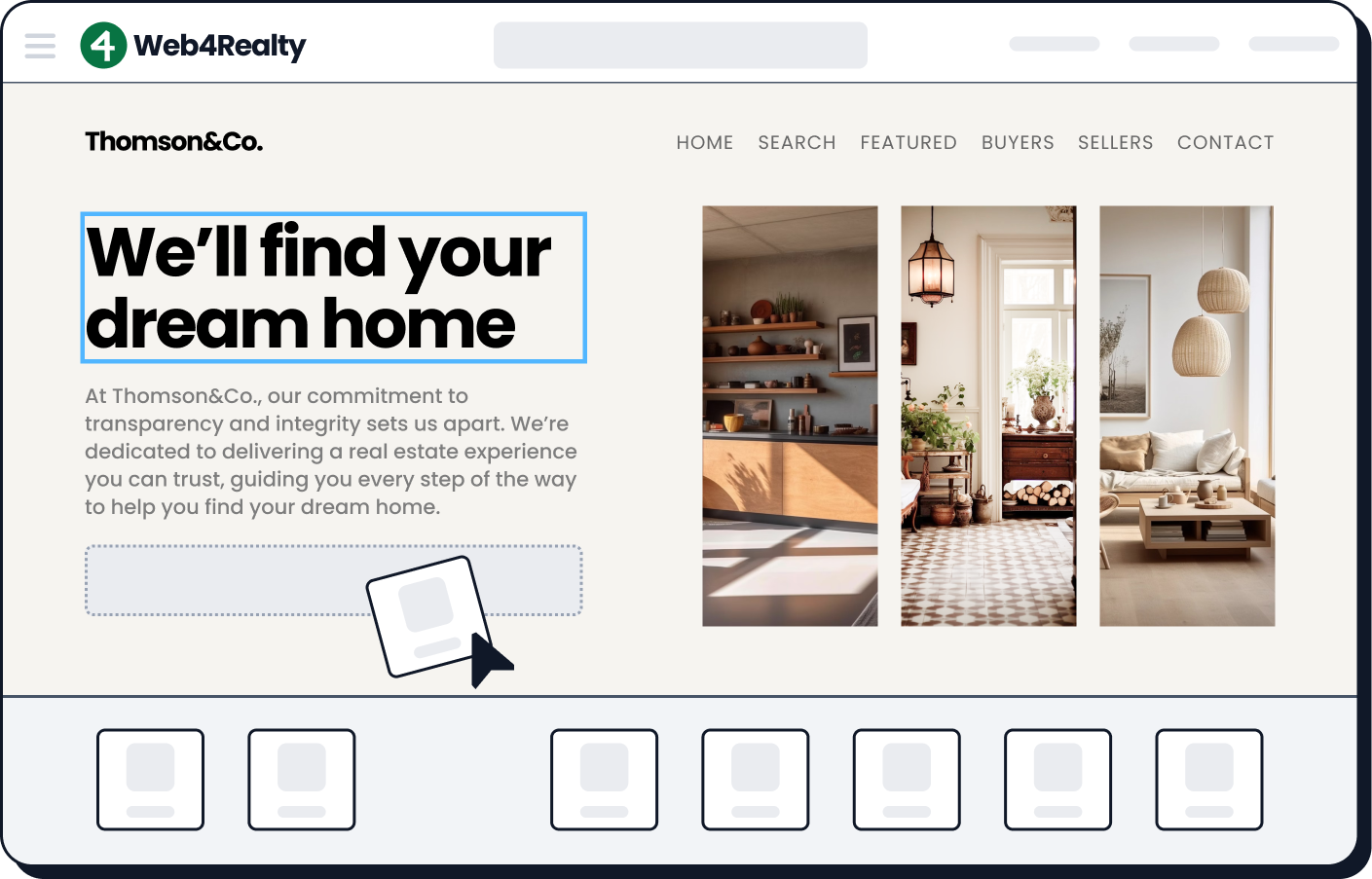You’ve probably heard of the National Association of Realtors (NAR) statistic that 43% of buyers began their search online, and a whopping 97% used the internet to search for properties.
While that huge percentage is encouraging, knowing you’ll be up against giants like Zillow, Realtor, and Redfin, makes it seem like a David vs Goliath endeavor.
After all, these are established sites with tons of listings and content at their disposal.
From the national chains to the solo agent trying to earn a listing to their name, everyone is trying their best to improve their visibility online because that’s where a lot of the prospects are.
And that’s why after getting a website, the next thing realtors are often advised to do is improve their website’s real estate SEO.
What is SEO for Real Estate?
Keywords, backlinks, and DR — there’s a lot of jargon that comes with implementing SEO. All of it boils down to one goal:
Showing up in Google (and other search engines like Yahoo, Bing, etc) when people search for a product or service they need.
In your case, that would be the search for an agent, or a property to buy or rent.
Put yourself in your prospect’s shoes. You’re looking for a home in a new city, but aren’t sure where to start the search. You have an idea of the kind of property you need, and the kind of neighborhood you prefer— what do you do?
If you’re like many of the typical buyers, you’ll go straight to Google and start searching the following…
“School district homes Chicago”
“Best neighborhood Chicago”
Prospects more familiar with their target city will go with more specific searches like,
“2 BR for sale Lincoln Park Chicago”
“Townhouse for sale South Chicago”
Now we all know, the default behavior is usually to check the first result, right?
In fact, a recent study by Sistrix confirms that 28.5% of the clicks go through the first website in the search results, and the click-through rate falls sharply for each position thereafter.

The second website that appears for a search gets 15.7% of the clicks, while the one at the bottom (10th) of the page gets a measly 2.5%.
So yes, when it comes to real estate SEO, there’s an advantage to getting at the top. If you pick the right keywords to rank for, you could get 28.5% more leads, every time someone searches properties in your area.
Still not sure about the lead generation potential of using SEO in real estate? Check out how much traffic this Miami-based real estate agency is getting from their SEO real estate efforts:
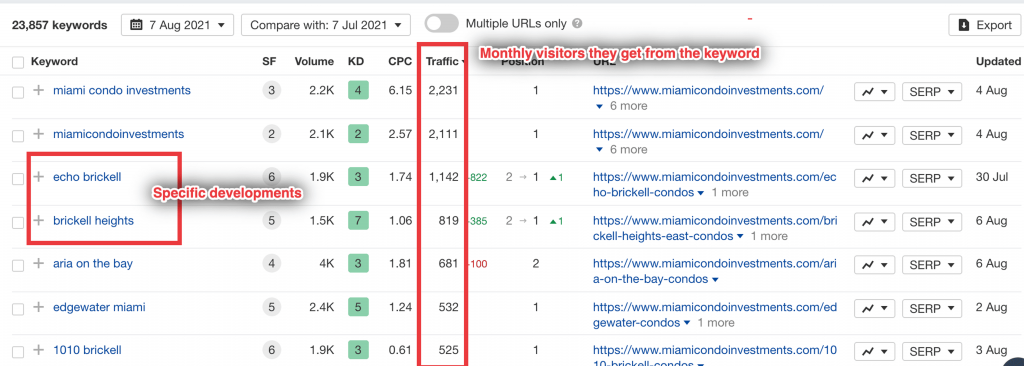
1000+ searches for properties on Echo Brickell and Brickell Heights — and that’s 1000+ potential leads per month for each term. They get about 600 more for Aria on the Bay, and a couple hundred more for other developments. Those are a lot of leads!
Now you might say those kinds of results are possible for established websites with tons of manpower— maybe a writer or an SEO agency doing the heavy lifting for them. Hired help will make the work faster, but lots of agents do their own SEO and online marketing, especially when they are starting out.
Wherever you look, there’s going to be hundreds to thousands of people searching for real estate every month.
If you search for keywords for real estate in Chicago , you’ll find tons of good options with decent traffic. A KD or “keyword difficulty” of 4 or 9 means you don’t need tons of content to rank for these terms, because there’s not much competition.
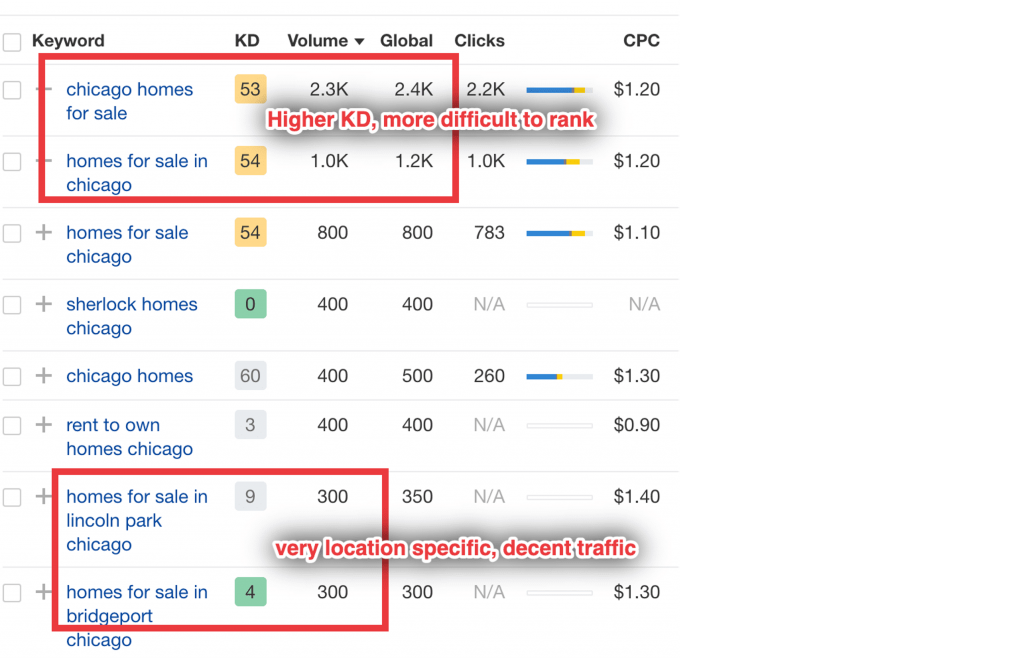
Going on Ahrefs, my preferred keyword research tool, I found that “Condos for sale San Antonio” gets 800+ searches a month, while “Homes for sale Washington DC” gets 700+.
Now if we consider that the #1 ranking site for those search terms get about 28.5% of the clicks,
That means ranking #1 for…
- Chicago homes for sale = 655 prospects searching for homes in Chicago
- Homes for sale Lincoln Park Chicago = 85 primed leads a month looking for listings in Lincoln Park
- Condos for sale San Antonio = 228 targeted leads going to your site every month
- Homes for sale Washington DC = 199.5 targeted leads every month
These are already primed leads, people that are ready to “buy,” and in the case of some keywords, specifically “where to buy.”
How to Use Real Estate SEO on Your Own Website, A DIY Approach
Now that we’re on the same page when it comes to the importance of SEO for real estate, let’s get down to the nitty gritty of implementing it.
In this guide, I’ll show you specific, actionable real estate website SEO strategies that you can use on your website and online marketing materials.
You won’t find theoretical advice that’ll leave you confused and scratching your head. My goal is to show you the basics plus some examples for each tip, so you can apply it to your site and get the needle moving on your traffic ASAP.
Since there are so many strategies on SEO for real estate, I’ll divide this guide into 3 sections:
- Local SEO: strategies to help your real estate IDX website rank for your target city or neighborhood
- On site SEO: things you can change or implement on your website to help Google understand it, and therefore show you on the search results for your chosen terms
- Linking: tips to get links and traffic from other websites
Ready? Here we go.
Local SEO Real Estate Strategies
1. Local Content
Real estate is a location-specific industry, and Google loves giving people specific advice, especially when it comes to their search queries.
When prospects search for properties, most of them would have a city, neighborhood, or specific development in mind.
That’s why searches like “Apartments in Silicon Valley” or “NY real estate agent” get more conversions than “best real estate agent” or “best cities for retirees.”
People who search for the latter are too early in their buyer’s journey. These keywords are also more competitive and harder to rank for in Google’s search results — because everybody’s using them. (More on keyword selection later).
Publishing location-specific content about your city shows Google (and site visitors) that you’re an expert in your local:
- Landmarks, restaurants, things to do — a huge consideration for yuppies and couples
- Schools — a common concern for parents when looking for property!
- Neighborhood crime rates
- Walkability score
- Bike routes
- Transportation options
- Shops and markets — did you know having a restaurant, book store, and a Starbucks within walking distance is a huge consideration for some buyers/renters??
Now you might think, writing about restaurants and city events isn’t useful because they’re not about real estate. That’s true, but these amenities are considerations prospects check before picking a neighborhood. If you show prospects that you’re knowledgeable about where the good restaurants and important commercial establishments are, they’re more likely to trust that you also know where the cool/safe/commute-friendly neighborhoods are.
Writing about local businesses has another SEO benefit, you can use these write-ups to get links and social media traffic to your site. That’s discussed later on, in the section about links.
Pro Tip: Watch this short video tutorial to learn how to add blog posts and other helpful local content to your real estate blog.
2. Optimize Your Site for Mobile Devices
Majority (54.8%) of the global internet traffic comes from mobile devices, according to Statista.
That means if you want your real estate website and IDX listings to be viewed by prospects, you need a site that doesn’t look wonky on mobile.
Specifically, you need a website with a “responsive-theme”, which means the font size, images, menu, and other features adapt when viewed on mobile devices, so that the visitor doesn’t have to zoom in and out just to read or scroll up.
Web4realty’s website themes are responsive and mobile friendly. But if you’re not with us yet, make sure your site has:
- Responsive theme or design
- Good page and hosting speed— if it’s too slow, they’ll go to another site
- Easy to use navigation and search box
- Mobile-friendly forms and popups — some pop-ups are hard to exit, fill-up on phones and tablets
- Good font size and color
- Clickable links
Design is very subjective but in general the goal is to keep things as simple as possible.
Related: Designing your website shouldn’t be so hard. Who says you have to do everything yourself? Check out our list of 20+ real estate design themes for websites.
3. Register at Google My Business (GMB) and Site Directories
This is what I see on my search results when I search for “East Texas Realtors,” a map followed by a list of real estate agencies in the vicinity. And that’s at the top of the organic search results.
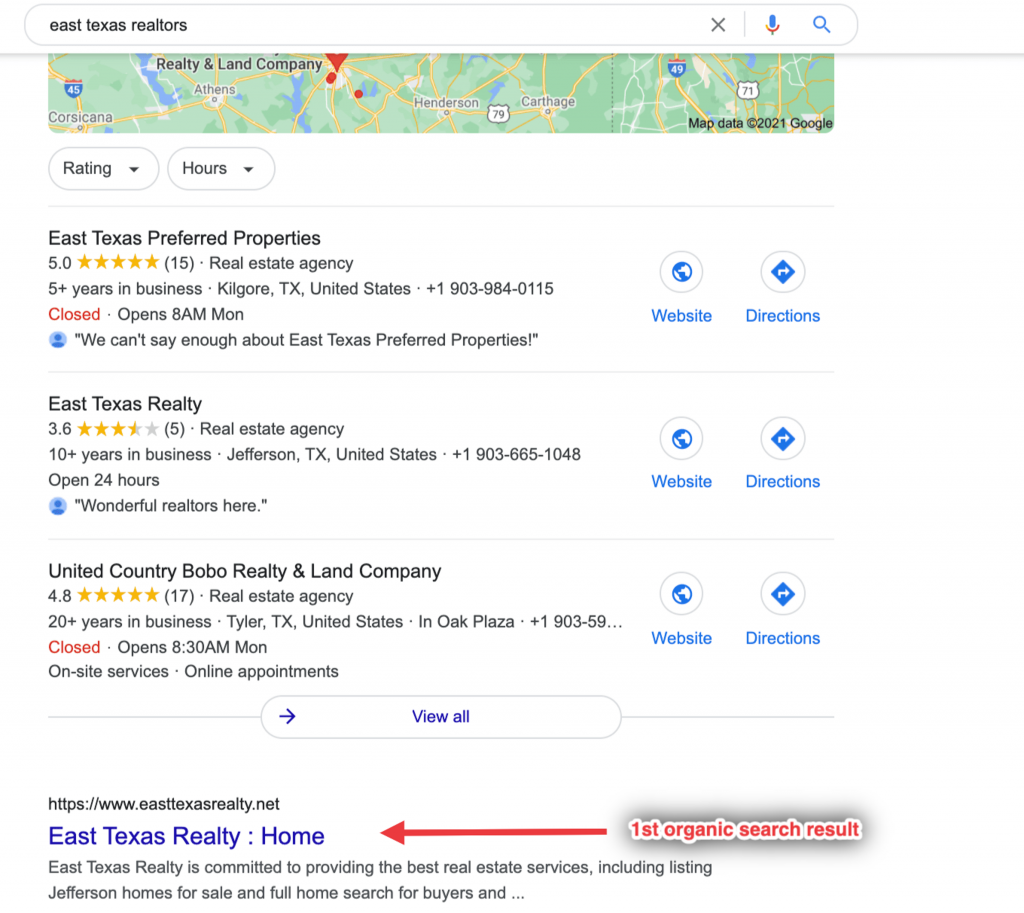
This is the power of having a Google My Business Profile. So if you don’t have one yet, go over there and sign-up for one now. Make sure to complete it with your updated name, address, and phone number (NAP).
Use the correct format that includes either numbers or dashes for your phone number to enable one-click calling to your number Google’s results. Example: (302) – 672 – 981.
Google only ranks a maximum of 3 businesses per local search, and they pick ones with the updated biz info, so make sure to fill out as much of the profile as you can.
How do they know the info is updated? They cross-check it with your site to validate the data.
While you’re doing this, you might as well sign up or claim the business profile other directories have for your site.
Go to:
- Realtor.com
- RedFin
- Local.com
- Yelp
- Neighborhood Scout
- Yellow Pages
- Manta
- Angie’s List
- White Pages
- CitySearch
Some of these directories are specific to real estate, while others are more generic. Traffic wise, you’ll probably get more inquiries claiming your listings and profile on Realtor.com compared to Yellow Pages. But these non-real estate directories are still important because Google recognizes their credibility in supplying information of businesses operating within a locale.
The more you register your business on these sites, the more Google recognizes you as a ‘local business’ operating in your area.
Just make sure you update these directories with the correct information about your business, because mismatching information will cause Google to doubt it’s info on you, and therefore not list you on local searches.
Pro Tip: Use websites like Yext or Local-Listings to push your business profile listing to all the major directories online. These are paid services but they can save you time from manually having to sign-up and create a profile with many online directories.
On Site SEO for Estate Agents
4. Choose Local and Hyper-local Keywords
Keywords can be categorized in 3 types: general, local, and hyperlocal. For real estate, general keywords would be “best real estate agent” or “tips for choosing a real estate agent.” These are high volume keywords but everybody is trying to rank for them as well, making it very hard to show up on the search results for these.
Use these keywords on your site, so Google can recognize that your business is related to these topics. But don’t make them the primary focus keyword of your writings and on-page SEO optimization.
Local keywords, on the other hand, would have at least the State and city + the generic keyword. For instance, a local version of the general keyword earlier is “best real estate agent in Valley, New Jersey” or for property related searches, “3 bedroom townhouse with yard at Casper, Wyoming.”
Competition for local keywords won’t be as tough as general keywords, because here you’ll only be competing with agents in the same state or city as you.
Chris Audette, a top performing agent at Calgary, shared his experience on choosing keywords for real estate…
“In our example, “Calgary real estate”, that’s the number one sought after term, both for search engine optimization organic, and for pay per click. It is by far the most competitive because everybody’s going after it. It’s the most searched as well.
So it’s high traffic, but it’s also by far the most costly and the least likely that you’re going to rank under it if you’re doing organic search engine optimization. And then if you’re doing organic, it is probably going to be years before you rank there.
For the longest time, we ranked number one spot for “Calgary real estate”. It was a great term and brought us a ton of traffic. But it didn’t really amount to all that many checks.
Like there wasn’t all that many commission checks coming through, you know from that term, because it was very early on in the user search process.”
Chris Audette
If you wish to go even further, you can create content on hyper-local keywords, such as those for specific streets, property developments, or neighborhoods. Search volume for these phrases might not be much, it can be as low as 50 searches a month.
But that also means you only need one or two dedicated blog posts or neighborhood pages around these topics, and you’ll automatically be at the #1 or 2 spots on the search results.
For example, if you’re an agent improving the real estate SEO of your listings in Arizona, the phrase “Tempe AZ homes for sale” gets 100 searches.

People also search for properties within specific zip codes, and you’ll have an easier time trying to rank for those queries online:

Pro Tip: Watch this video tutorial we created to learn how to optimize your real estate website.
5. Write Local Content
It’s obvious keywords with the words “buy,” “for sale,” “for rent,” specific to your area are super important to a real estate website.
But these keywords won’t get you a lot of links, which are important when it comes to SEO for real estate.
Not to get too technical, but basically the more websites link to you for certain topics, the more Google recognizes your site as an expert in that area. It’s like a voting system, and other sites voted for you through the links they have pointing to your site.
Just like other industries, the key to publishing content that gets links (and traffic) is choosing topics that’s useful to your prospects AND your peripheral audience: local businesses, local journalists/bloggers, and organizations.
For example, some of your prospects will first check the best school districts so they can choose a neighborhood that’s within those schools’ jurisdiction. From here, you can write content on keywords like “best Miami school districts” or “top 10 Miami school public school districts.”
Once that’s published, you can go around and contact local mom or parent bloggers to link or share your content. Some schools may even include your write-up in their website’s resource or media mentions page.
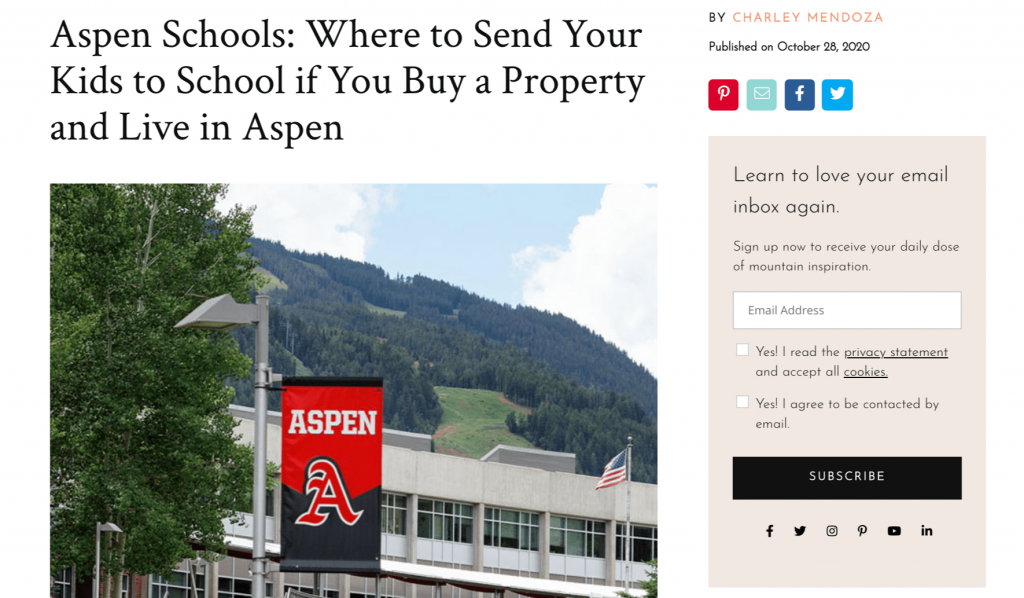

Blog posts like this will be helpful to your readers, especially if you include a bit of info, such as the school’s grade levels and contact information.
You can apply this strategy to malls, retail stores, and other commercial establishments. Many of them have websites and social media pages, some even have links that point to the websites of nearby establishments.
Local top of the funnel content ideas:
- Best restaurants
- Best bars
- Best gyms and activities
- Best museums and parks
- Local attractions and annual events
- Bike score and walking score
- Fun things to do
It also works if you write about performances, community gatherings, and other events in your city. The organizers of those events will want to link to your writeup of their event on their website and social pages.
Then of course, there’s also the side benefit that when these business owners and event organizers need something real estate, they’ll contact you. You’re top of mind and have already shown you know the ins-and-outs of your area through your write ups!
Related: Blogging doesn’t have to be a complicated, time consuming affair. Check out the videos we compiled on this page for a short crash course on blogging for real estate SEO.
6. Insert Keywords at the Right Places
Now that you know the right keywords to use, it’s time to put them on your site strategically.
As smart as Google is, it doesn’t ‘read’ everything that gets published online from top to bottom. It scans a page and checks specific locations, such as the headlines and images, to understand what its about.
That means, you can’t just insert a bunch of keywords a couple of times and hope for the best.
Best places to insert keywords on your site:
- Headline or H1
- Headers: H2, H3, H4 — think of these as if Google is reading an essay, the H2 are the topic headlines explaining what a paragraph is about, while the H3 and H4 extras further explain it.
- URL: don’t just use the default URL the website comes up with. Insert a keyword there and make sure it makes sense. Ex: Torontoagent.com/yorkvillecondos, the “yorkvillecondos” added to the URL being the keyword.
- Page Title
- Meta description: Watch this video to see how to add meta tags on Web4Realty.

- Image titles: use a keyword and a brief description in your image’s file names when you upload them to your site.
- ALT image tags
- Elsewhere in the page content: Ideally at the start and end of each page, and wherever appropriate.
This means, for every page on your site, there’s a minimum of 7 areas to insert a keyword. If you have multiple pictures and subheadings in a post, you’ll have more places to enter.
Here are visual examples of where to insert keywords in your site:
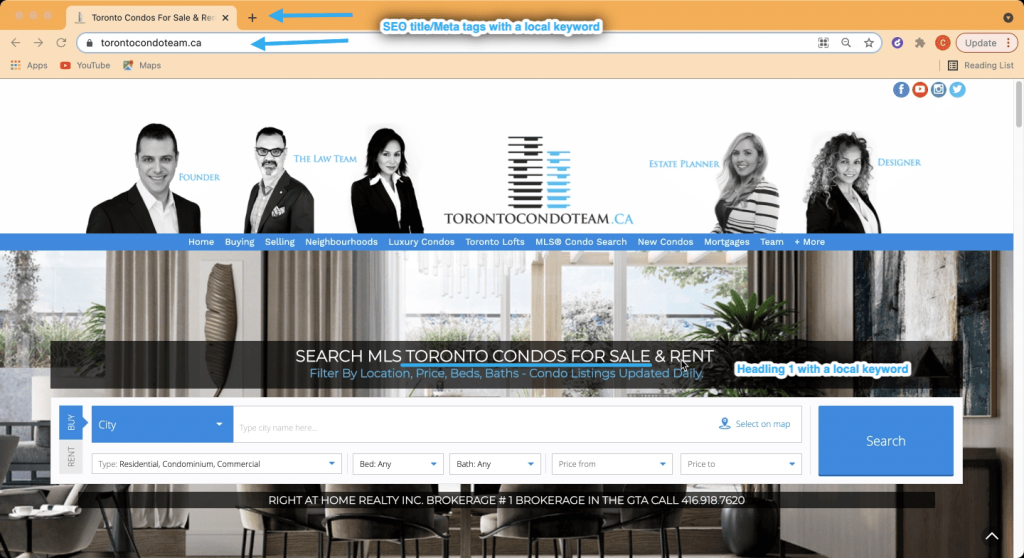
Watch this tutorial to find out how to add an ALT image text on your real estate website’s property listing and other images.
Pro Tip: Don’t stuff keywords in your content just to bulk up the volume. Google has already wised up to this strategy and has penalized websites for it.
Internal and External Linking Strategies for Real Estate SEO
7. Add Your Listings and Neighborhood Guides on Pinterest
I know lots of agents love sharing their listings and recent transactions on Facebook and LinkedIn
There’s one social network you’re neglecting for your real estate marketing— Pinterest.
It drives more web traffic compared to Facebook and Twitter, plus the “pins” or posts there have a long lifespan online, unlike Facebook posts that easily get buried and rarely show up on Google search results.
Aside from the back links you’ll get you’ll have two extra avenues from traffic.
- Google traffic: coming from search results where the results include an image or board from Pinterest.
- Traffic from Pinterest users: There are many topics where users don’t go to Google or Facebook to search for information. They go directly to Pinterest to research recipes, cooking, or home design inspiration, but this is now happening for real estate too, where users save links to neighborhoods and houses they like.
8. Group Listings and Local Content in Neighborhood Pages
So you have a collection of listings on different neighborhoods and streets. Now since listing statuses and property inventories change regularly, it’s better to create a neighborhood page for each main area you serve, and then put all the active listings there.
What’s in a neighborhood page?
- Neighborhood description
- Video of the neighborhood: optional but great for real estate SEO and user conversions. Some people don’t want to read a lengthy description, they want to see the place for themselves.
- Listings for that neighborhood, if it’s a small neighborhood
- Short description or headline with link going to the property development or streets in that neighborhood
- Walkability score
Example: For this Toronto based real estate agent, they had a neighborhood page called “CityPlace Condos” that then links to multiple pages for specific condo developments in that area.
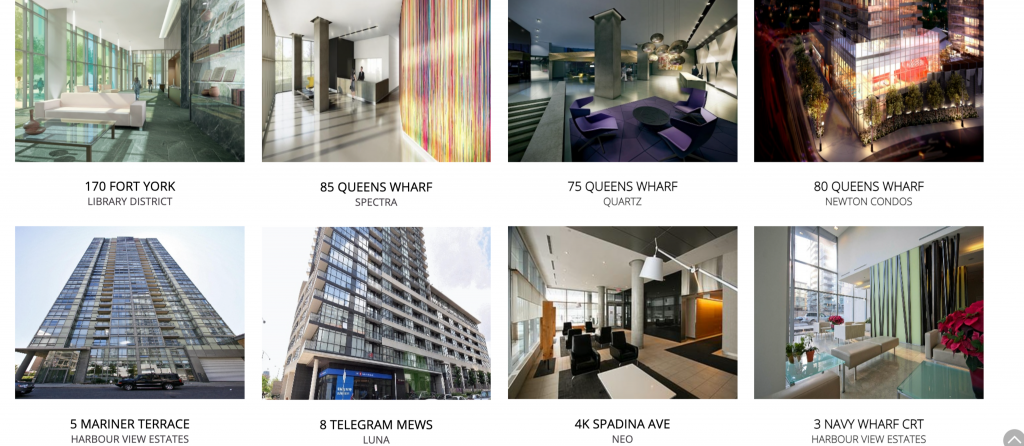
In the screenshot above, you’ll see they have dedicated pages for listings in Queens Wharf, all the way to Fort York and Spadina Ave. This way, it’s easier for users to search specifically on the neighborhood or building they like.
It’s also easier for Google to rank the site for hyper-local keywords such as “Queens Wharf Toronto condos for sale” or “Queens Wharf CityPlace for sale”
A good real estate website builder should have IDX integrations that allow you to add listings not just on neighborhood pages but on blog posts and other relevant content, too.
Related: Check out this video to see how you can easily create custom IDX listings on your pages at Web4Realty.
Aside from a brief introduction of the neighborhood, list the specific restaurants, schools, and other points of interest nearby. Your potential leads will appreciate how you’re giving them the information they’ll need to decide if a neighborhood is good, all in one spot.
If you were a service provider, these neighborhood pages would be your main product offerings, the unchanging guard where all the information about each market you serve is listed.
Unlike property listings and blog posts, these neighborhood pages won’t be deleted or changed much in the future, except for the links you add to new developments or attractions to the area.
Make sure that the blog posts also reference the neighborhood where the point of interest is located, and link to that. Doing this is great for real estate SEO because the internal links, from your local restaurant and school blog posts going to the neighborhood page, shows Google that those pages are related.
Here’s a visual to show how that interlinking looks:
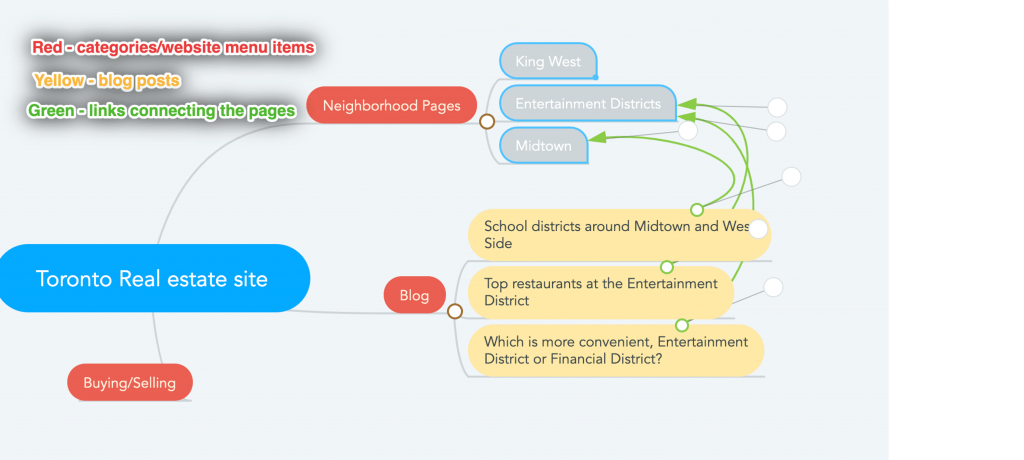
9. Contribute to Local and Industry Publications
Share your insights on what’s happening with your local real estate market at industry publications like Inman, RISMedia, and the NAR’s The Lounge (Young Professionals Network). All 3 sites accept content contributions in the form of guest posts, columns, or market news from real estate agents.
You can also find more websites that accept content from agents by searching the following terms:
- Local keyword + real estate + “write for us”
- Local keyword + real estate + “guest blog”
- Local keyword + real estate + “contribute”
- Real estate + “guest post”
- Property agents + “guest blog”
- Local keyword + where to live + write for us”
Any combination of the keywords above will show you a list of pages that accept content contributions, along with their guidelines for the type and topic of content accepted.
How can I Improve My Website’s Real Estate SEO if I Don’t Have Much Time?
These tips probably look overwhelming right now but you can apply these things one at a time.
Start with the easy ones, like registering for Google my Business, then move on to creating neighborhood pages and so on.
To recap, here are 9 easy to apply SEO for real estate strategies:
- Create local content
- Make sure your site is mobile friendly
- Register for local directories with your up to date contact information
- Choose local and hyper local keywords for real estate listings relevant to the market you serve
- Write helpful content about your neighborhood
- Insert keywords for real estate at strategic areas
- Use Pinterest to make your content more shareable
- Organize your site around neighborhood pages
- Contribute content to local websites to get backlinks that boost your real estate SEO
